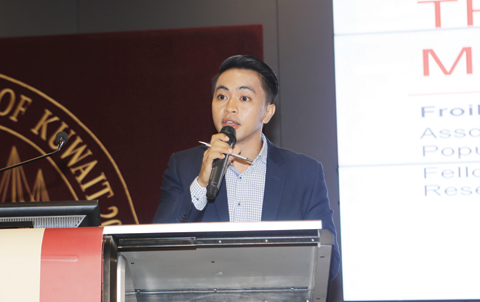Researcher spoke at an American University of Kuwait lecture
 KUWAIT: Froilan T Malit Jr, Research Fellow at the Institute for Social and Economic Research at Zayed University in Dubai, speaks at the American University of Kuwait yesterday. — Photo by Joseph Shagra
KUWAIT: Froilan T Malit Jr, Research Fellow at the Institute for Social and Economic Research at Zayed University in Dubai, speaks at the American University of Kuwait yesterday. — Photo by Joseph ShagraKUWAIT: Both labor sending and receiving countries must have shared responsibilities for the well-being of migrant workers, said Froilan T Malit Jr, Research Fellow at the Institute for Social and Economic Research at Zayed University in Dubai. Speaking at the American University of Kuwait, Malit said labor migration, in the Philippines for example, is considered temporary, but the economic needs back home of both workers and the country itself for job generating purposes and the need to fill shortages of labor in receiving nations have to be satisfied.
"The migration trend in this part of the word - particularly in the GCC countries - continues, and this is because of the need for the supply of manpower and the need for the job and dollars of labor sending countries," he said. Economically speaking, the researcher said governments of labor exporting countries cannot provide ample jobs for their citizens, thereby sending workers (although sending workers is not a right term because the governments argue it is the workers' prerogative to go abroad) is the way out for their citizens to look for greener pastures, thus providing for the needs of their families including education for their children.
Labor migration
According to Malit, labor migration, especially in the GCC countries, will continue to rise due to economic challenges back home and the need for workers here. He also cited the growing population and the high fertility rate in the Middle East, which also adds to the demand. "Yes, we are filling the gap, but as we fill the gap, we are able to send our children to schools and provide for the needs of our families and the need for a job, which is the duty of the government to provide," he said.
According to Malit's research, global migration stood at 152.5 million in the 1990s, but grew to 257.7 million in 2017. He said international diplomatic cooperation and accountability are key elements in governing temporary labor workforce. He also mentioned the need for more accountability on the part of receiving countries, especially in terms of implementing the laws and more accountability on the part of employers and recruitment agencies.
Some issues of labor migration include the never-ending abuses and mistreatment of mostly domestic helpers, human trafficking and unpaid salaries among others. He also shared some of his research about the Philippines labor policy and history, which he claimed started during the 1960s or the oil boom in Saudi Arabia. He said the demand for skilled and semi-skilled workers will continue in the years to come.
By Ben Garcia










